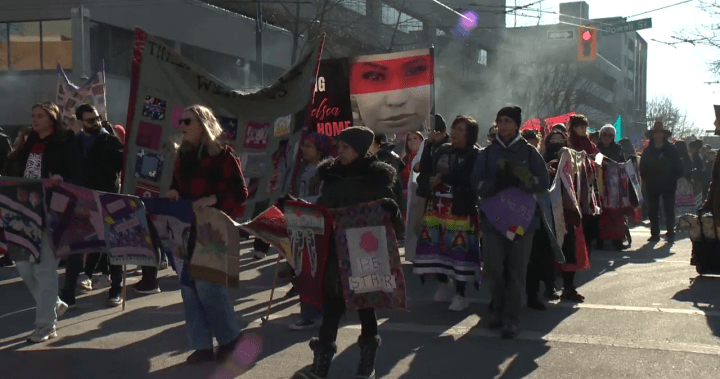Tribute to Missing and Murdered Indigenous Women
On Friday, communities across British Columbia united in solidarity for the annual Women’s Memorial March, a poignant gathering that drew thousands to advocate for justice and commemorate beloved lives lost.
This year marks the 34th anniversary of families, friends, and activists marching on February 14 to honor Indigenous women and girls who have gone missing or been murdered. Despite the passage of time, many participants express a sense of stagnation, feeling that meaningful change has yet to materialize.
Carol Martin, an organizer from Vancouver, poignantly shared her personal story: “After 35 years working here, I faced an unimaginable tragedy when my daughter was brutally attacked. Despite her being stabbed multiple times and placed on life support, no charges were brought against her assailant.” She emphasized, “The justice system must reevaluate how it addresses the needs of victims and the accountability of those who harm our women.”
Vancouver’s Downtown Eastside, a neighborhood disproportionately affected by the crisis, witnessed large crowds marching through its streets. The procession paused at significant locations, remembering the last known whereabouts of women who have disappeared.
Simultaneously, a march unfolded in Surrey, sharing a unified message of remembrance. Deana McDonald, marching for her son lost to violence in Edmonton in 2009, expressed, “We gather today to honor our sisters and all who have suffered. I stand here for him because justice is still out of reach.”
She lamented the ongoing tragedy, stating, “We are still being targeted, and the absence of justice is palpable.”
In Prince George, known as the endpoint of the infamous “Highway of Tears,” hundreds gathered to bring awareness to a crisis that has seen at least 18 Indigenous individuals disappear or be murdered along this stretch, though many believe the actual numbers to be much higher.
“What we need is action,” urged Julie Daum from Carrier Sekani Family Services. “We must not only sympathize but also actively participate in change. Love is more than a feeling; it requires action.”
A national inquiry into missing and murdered Indigenous women and girls, concluded in 2019, denounced the crisis as stemming from systemic racism and violations of rights against these women. Former B.C. judge Marion Buller labeled the ongoing violence as genocide and called for over 200 measures to ensure accountability from various levels of government.
Yet, according to a review by the Assembly of First Nations, as of last summer, only two of those calls for justice have seen complete implementation.


